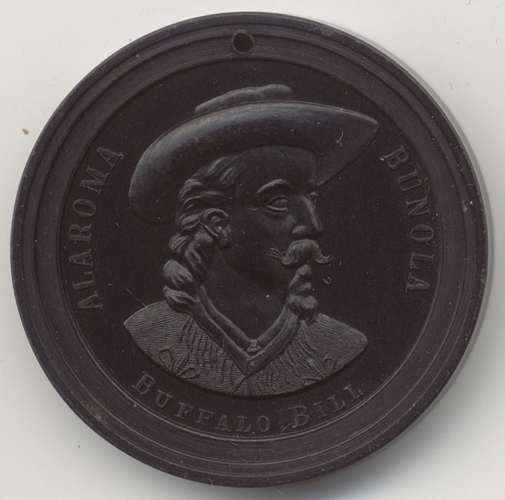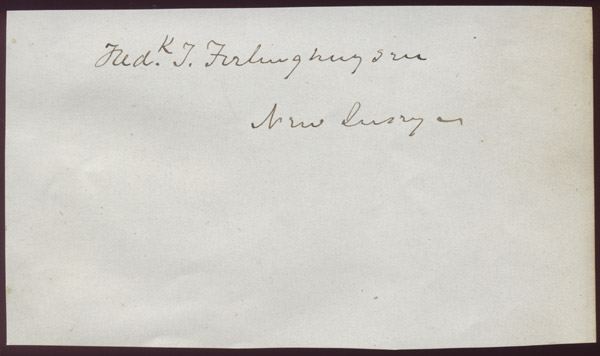Reported to have benn clipped from a 1867 Senate Chambers Autograph Book.
Birth
He was born was born in Millstone, New Jersey to Frederick Frelinghuysen (1788–1820) and Mary Dumont. His father died when he was just three years old, and he was adopted by his uncle, Theodore Frelinghuysen (1787–1862).
Famous family
His grandfather, Frederick Frelinghuysen (1753–1804), was an eminent lawyer, one of the framers of the first New Jersey constitution, a soldier in the American Revolutionary War and a member (1778–1779 and 1782–1783) of the Continental Congress from New Jersey, and from 1793 to 1796 a member of the United States Senate. His uncle, Theodore Frelinghuysen (1787–1862), was Attorney General of New Jersey from 1817 to 1829, was a U.S. Senator from New Jersey from 1829 to 1835, was the Whig candidate for Vice President of the United States on the Henry Clay ticket in the U.S. presidential election, 1844, and was Chancellor of New York University from 1839 until 1850 and president of Rutgers College from 1850 to 1862.
Education
He graduated from Rutgers in 1836, and studied law in Newark with his uncle, to whose practice he succeeded in 1839, after he was admitted to the bar. He became attorney for the Central Railroad of New Jersey, the Morris Canal and Banking Company and other corporations.
Marriage
He married Matilda Elizabeth Griswold and had several children including: George Griswold Frelinghuysen (1851–?), who was born in Newark, New Jersey.
Politics
He was a delegate to the Republican National Convention from New Jersey in 1860 and from 1861 to 1867 was Attorney General of New Jersey. In 1861 he was a delegate to the Peace Congress at Washington, and in 1866 was appointed by the Governor of New Jersey, as a Republican, to fill a vacancy in the United States Senate. In the winter of 1867 he was elected to fill the unexpired term, but a Democratic majority in the New Jersey State Legislature prevented his re-election in 1869. In 1870 he was nominated by President Ulysses S. Grant, and confirmed by the Senate, as United States minister to England to succeed John Lothrop Motley, but declined the mission. From 1871 to 1877 he was again a member of the United States Senate, in which he was prominent in debate and in committee work, and was chairman of the U.S. Senate Committee on Foreign Affairs during the Alabama Claims negotiations. He was a strong opponent of the Reconstruction measures of President Andrew Johnson, for whose conviction he voted (on most of the specific charges) in the impeachment trial. He was a member of the joint committee which drew up and reported (1877) the Electoral Commission Bill, and subsequently served as a member of the commission. He was a member of the Electoral Commission that decided the 1876 Presidential election. As a Republican, he voted with the eight-member majority on all counts. On December 12, 1881, he was appointed United States Secretary of State by President Chester Arthur to succeed James G. Blaine, and served until the inauguration of President Grover Cleveland in 1885.
Retirement and death
He retired from work and moved back to his home in Newark. Frederick died there in May less than three months after retiring. He was buried at Mount Pleasant Cemetery in Newark. Preceded by: William WrightU.S. Senator from New Jersey 1867–1869Succeeded by: John P. Stockton Preceded by: Alexander CattellU.S. Senator from New Jersey 1871–1877Succeeded by: John McPherson Preceded by: James G. BlaineUnited States Secretary of State 1881–1885Succeeded by: Thomas F. Bayard


